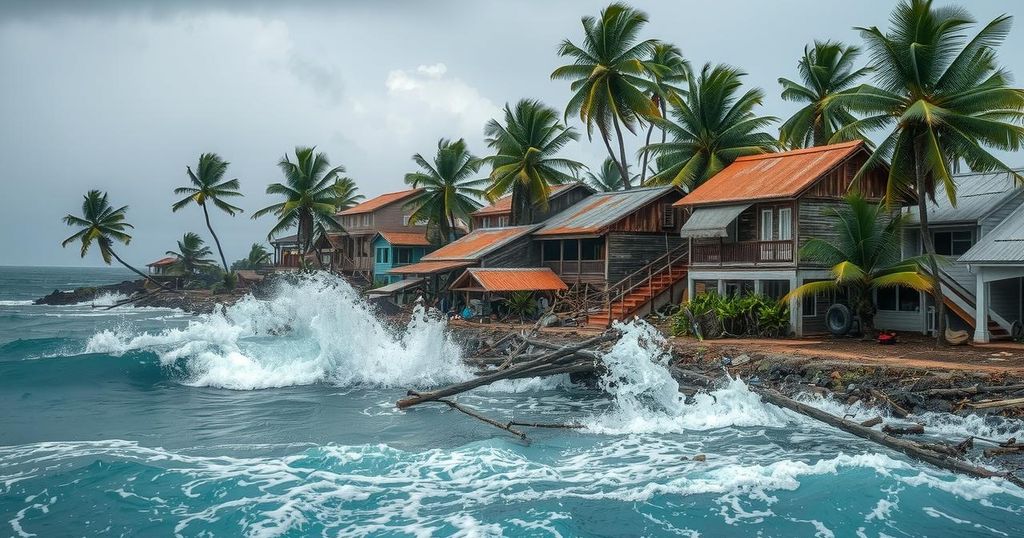Tropical Cyclone Chido’s Devastating Impact on Mayotte
On December 14, tropical cyclone Chido struck Mayotte, generating winds over 200 km/h and leading to significant destruction and loss of life. Classified as the strongest storm in 90 years for the island, it prompted national mourning in France and extensive emergency operations. Despite effective warning systems, the impact was devastating, highlighting the vulnerability of informal housing structures in the region.
Tropical cyclone Chido significantly impacted the island of Mayotte on December 14, unleashing winds exceeding 200 kilometers per hour and gusts surpassing 225 kilometers per hour. This cyclone was notably the strongest to strike Mayotte in nearly 90 years, as verified by Météo-France. Alongside the fierce winds, Chido unleashed torrential rains—176 mm within just 12 hours—and created perilous sea conditions with average wave heights upwards of five meters. The force of the cyclone was such that it severely damaged some of Météo-France’s observation facilities.
In response to this devastating event, French President Emmanuel Macron declared a period of national mourning. An extensive emergency and relief operation was set in motion amidst early assessments indicating that hundreds of individuals may have lost their lives on the island, which is not accustomed to such severe tropical cyclones and features numerous informal housing structures. The death toll rose even after multiple timely alerts were issued by Météo-France, including a red alert that escalated to a rare violet alert as the cyclone approached.
Chido’s trajectory was atypical, as it bypassed the larger island of Madagascar, which could have potentially diminished its strength. Instead, it made direct landfall on Mayotte as a powerful tropical cyclone. The following day, Chido continued its course, reaching Mozambique on December 15 before losing intensity and causing heavy rainfall in both Mozambique and Malawi.
Météo-France has noted that while the impact of climate change on such phenomena remains unclear, the specific path and direct hit on Mayotte were pivotal in the destruction caused by Chido. The agency indicated, “Our current state of knowledge doesn’t allow us to draw any conclusions about the role of climate change on the track of the cyclone and on its intensity.” Furthermore, Météo-France La Réunion, as the World Meteorological Organization’s Regional Specialized Meteorological Centre for the South-West Indian Ocean, highlighted that the seasonal forecast issued on October 31 predicted an early start to the upcoming cyclone season, which is expected to be characterized by near-normal to above-normal activity.
Tropical cyclones, also known as hurricanes or typhoons in different regions, are severe atmospheric disturbances that can cause substantial destruction and loss of life. The Indian Ocean is susceptible to such cyclonic activities, and Mayotte, a small French territory, is particularly vulnerable due to its geographic location and the nature of its infrastructure. Despite advancements in meteorological forecasting, the impact of natural disasters like Chido underscores the profound effects of climate variability and the challenges in predicting individual cyclone behavior and its consequences. Météo-France, the national meteorological service of France, plays a crucial role in forecasting tropical storms and has been pivotal in providing timely warnings, though challenges remain in mitigating the losses associated with these extreme weather events.
The catastrophic impact of tropical cyclone Chido on Mayotte serves as a poignant reminder of the vulnerability of small island communities to extreme weather. Despite prompt warnings from Météo-France, the loss of life was significant, revealing the challenges faced by regions unaccustomed to such severe cyclonic activity. The storm not only showcases the forces of nature but also raises critical questions regarding preparedness and resilience in the face of climate change. As the world braces for an active cyclone season, the incidents in Mayotte warrant attention towards improving disaster response and infrastructure resilience.
Original Source: wmo.int




Post Comment